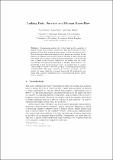Files in this item
Linking data, services and human know-how
Item metadata
| dc.contributor.author | Pareti, Paolo | |
| dc.contributor.author | Klein, Ewan | |
| dc.contributor.author | Barker, Adam David | |
| dc.contributor.editor | Sack, Harald | |
| dc.contributor.editor | Blomqvist, Eva | |
| dc.contributor.editor | d'Aquin, Mathieu | |
| dc.contributor.editor | Ponzetto, Simone Paolo | |
| dc.contributor.editor | Lange, Christoph | |
| dc.date.accessioned | 2017-05-14T23:35:11Z | |
| dc.date.available | 2017-05-14T23:35:11Z | |
| dc.date.issued | 2016 | |
| dc.identifier | 241609028 | |
| dc.identifier | 947f1dab-0fb2-430d-beac-b3e67f7de9d3 | |
| dc.identifier | 84979025798 | |
| dc.identifier | 000379122700031 | |
| dc.identifier.citation | Pareti , P , Klein , E & Barker , A D 2016 , Linking data, services and human know-how . in H Sack , E Blomqvist , M d'Aquin , S P Ponzetto & C Lange (eds) , The Semantic Web. Latest Advances and New Domains : 13th International Conference, ESWC 2016, Heraklion, Crete, Greece, May 29 -- June 2, 2016, Proceedings . Lecture Notes in Computer Science , vol. 9678 , Springer , pp. 505-520 , 13th ESWC 2016 , Heraklion, Crete , Greece , 29/05/16 . https://doi.org/10.1007/978-3-319-34129-3_31 | en |
| dc.identifier.citation | conference | en |
| dc.identifier.isbn | 9783319341286 | |
| dc.identifier.isbn | 9783319341293 | |
| dc.identifier.uri | https://hdl.handle.net/10023/10773 | |
| dc.description.abstract | An increasing number of everyday tasks involve a mixture of human actions and machine computation. This paper presents the first framework that allows non-programmer users to create and execute workflows where each task can be completed by a human or a machine. In this framework, humans and machines interact through a shared knowledge base which is both human and machine understandable. This knowledge base is based on the PROHOW Linked Data vocabulary that can represent human instructions and link them to machine functionalities. Our hypothesis is that non-programmer users can describe how to achievecertain tasks at a level of abstraction which is both human and machine understandable. This paper presents the PROHOW vocabulary and describes its usage within the proposed framework. We substantiate our claim with a concrete implementation of our framework and by experimental evidence. | |
| dc.format.extent | 348865 | |
| dc.language.iso | eng | |
| dc.publisher | Springer | |
| dc.relation.ispartof | The Semantic Web. Latest Advances and New Domains | en |
| dc.relation.ispartofseries | Lecture Notes in Computer Science | en |
| dc.subject | QA75 Electronic computers. Computer science | en |
| dc.subject | NDAS | en |
| dc.subject.lcc | QA75 | en |
| dc.title | Linking data, services and human know-how | en |
| dc.type | Conference item | en |
| dc.contributor.institution | University of St Andrews. School of Computer Science | en |
| dc.identifier.doi | https://doi.org/10.1007/978-3-319-34129-3_31 | |
| dc.date.embargoedUntil | 2017-05-14 |
This item appears in the following Collection(s)
Items in the St Andrews Research Repository are protected by copyright, with all rights reserved, unless otherwise indicated.

